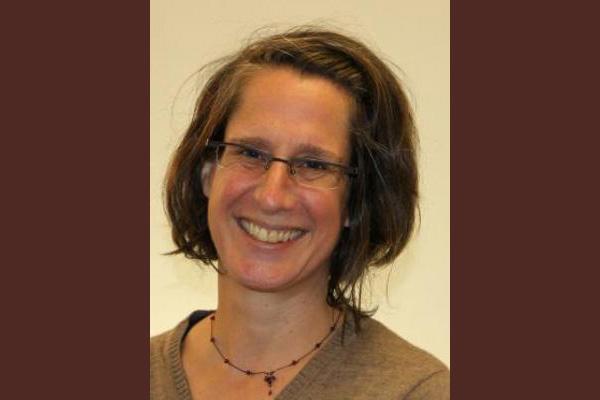Q&A faculty spotlight: Elizabeth Hewitt

Elizabeth Hewitt is a professor in the Department of English. Her work concentrates on pre-1900 American and African American literature. Her most recent book, Speculative Fictions: Explaining the Economy in the Early United States (Oxford UP, 2020), studies the fiscal debates between the Federalist and Democratic-Republican parties, arguing that the key to the dispute is not found in economic policy but explanatory style. She is currently researching the long history of science fiction, especially the utopian fictions and experiments in the 19th century U.S. Hewitt graduated with a BA in English and political science from Amherst College in 1988 and went on to receive an MA in 1992 and PhD in 1995 in English literature from Johns Hopkins University.
Describe your current research or area of interest
My research specialty is in 18th and 19th century U.S. literature, and I’m especially interested in genres that aren’t necessarily associated with literary studies — political, economic, scientific and personal writing (letters, diaries). But I also work on the more conventional literary genres of poetry and fiction.
What/who influenced you to select your area(s) of study and how has that impacted your career?
I came to the study of literature relatively late — adding an English major in my final year of college. As a political science major, I had written a senior thesis on utopianism and realized that I was particularly interested in imaginative writing about governance and socio-economic policy. I was lucky enough to have had superb teachers in both literature and political science in both college and graduate school who allowed me to couple these interests.
What undergraduate classes do you teach?
My most recent class was a world literature class focusing on literature of the Black Atlantic. I also regularly teach the survey class of early American literature, classes on science fiction (including one on post-apocalyptic literature and one on feminist science fiction), upper-level classes in early U.S. literature that emphasize some of the topics I describe above (financial speculation, slavery, democratic theory, utopianism, feminism, etc.)
Why would you encourage students to take these classes, and how might they be of interest to students majoring in other disciplines?
I think a student should take these classes because it will them an opportunity to read remarkable literature in a variety of genres (essays, novels, stories, poems, comics, and films) which will show them how to think about their world in entirely new ways. And the topics are of interest to students across disciplines. When they read Alexander Hamilton, they will better understand the function of debt and credit; when they read Emily Dickinson, they will better understand the limits of language to describe pain; when they read Toni Morrison, they will better understand the long legacy of American slavery and racism.
What aspects of your teaching give you the most satisfaction?
I enjoy pretty much all aspects of teaching. Even though I’ve been doing it for almost three decades, I still get nervous before classes; but there is nothing more exhilarating than sharing material with my students and watching them discover the worlds that literature unlocks.
Are there opportunities for undergraduates to connect with you for research or creative activity?
I often supervise senior theses and right now I’m working with a group of students on a new research project: each person is going to curate a digital archive of visual materials that will involve research with the collection at the Billy Ireland Cartoon Library. I’m also the director of undergraduate studies for the Department of English and we’ve been talking a lot about how to incorporate research into the major. I’d love to talk, so just email me (Hewitt.33@osu.edu).
Share more about any study abroad programs you lead
This June, I was able to take a group of students to London for the Literature and Culture of London Study Abroad program. It was an amazing experience: we spent four weeks living in London, visiting museums, gardens, houses, and learning about why London has been at the center of imaginative and financial speculation for so long.
What book/movie would you recommend, or what music do you enjoy?
That’s a hard question because there are so many books, movies, music, comics, television, that I enjoy. The film I saw most recently that I really loved was Everything Everywhere All at Once. My favorite books are probably George Eliot’s Middlemarch, Toni Morrison’s Song of Solomon, and David Mitchell’s Cloud Atlas. According to Spotify, the artist I have listened to the most for the last decade is Frank Ocean.
What is the most interesting place you’ve visited?
I honestly think most places are interesting, and I like learning about them when I travel, whether that is to Rome or Chillicothe. One of my favorite poems is Elizabeth Bishop’s “Questions of Travel” which is about we visit other places.
What is the best advice you’ve received?
I’m going to instead answer the opposite question, ‘What is the worst advice you ever received?” When I was a freshman, a professor told me that I was a lousy writer and I shouldn’t pick a major that required it. My own advice, then, is don’t let people undermine your confidence: hard work makes anything possible.
When you encourage students to stop by your office hours, what do you most love talking about?
Novels, movies, television, poetry, comics, music, science fiction, US history, fashion, cooking, national parks, economics, politics, sports (especially basketball), art, museums, traveling, knitting, board games, video games, textile arts, knife sharpening. There’s not much that I don’t like talking about.
Would you like to share a fun/interesting fact about yourself?
Both my children are Buckeyes!
Learn more about Professor Hewitt's work, email and office location on her department page.
